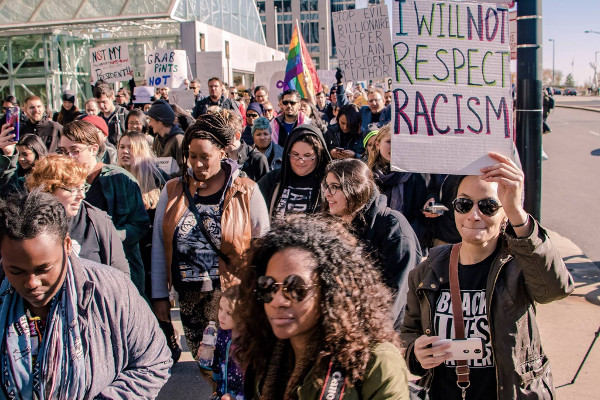
Photo/Bob Simpson
As we celebrate African American History Month, 2017, millions of Americans continue to “baptize” President Trump with sustained, massive protests against his racially divisive rhetoric. Some of those protesters correctly decoded Trump’s rhetoric by carrying signs that read that what Trump is really saying is: “Make America hate again.” On the occassion of African American History Month, let’s look at the past that Donald Trump, and his billionaire class, want to take us back to. And most importantly, let’s draw lessons from that past that will help our movement today.
In the year of 1640, three indentured servants, “Victor, a Dutchman, the other a Scotchman called James Gregory,” and “the third being a Negro named John Punch,” escaped from their master. When they were captured and brought to court, they received “the punishment of whipping and thirty stripes apiece.” In addition, the two Europeans each had their indentured service extended four extra years. However, John Punch, the African, was sentenced to indentured servitude, “for the time of his natural life.” (Source: McIlwaine, ed., Minutes of the Council and General Court of Colonial Virginia, P. 468. July 9, 1640—Punishment for Runaway Servants.)
There was no statute in British Common Law causing the court to make this decision. But the effect was clear. Those men entered that courtroom united by bonds of class and left with those bonds effectively torn apart.
The slave owning ruling class of 1640 feared that any cooperation between African and European slaves would lead, not just to running away, but open rebellion. They solved their problem that very same year by passing the first laws mandating slavery as the permanent condition of Africans. These laws would later spread throughout the colonies.
The American Revolution, the Civil War and the Civil Rights Movement were all leaps in American history. And yet we are still haunted by the legacy of slavery.
As Americans, we have been conditioned by our ruling class to be race conscious instead of class conscious. Unequals could not unite. However, there is a permanent economic equality of absolute poverty growing, most obviously seen among the homeless and those not far from it. They possess neither property nor privilege. There, unity is most possible. Their survival depends on it.
Trump and his corporate class friends are trying to resurrect the ghosts of racial hatred handed down by the slave masters of old. Their goal is the same: end resistance and rebellion. As humanity enters the next historical leap brought on by the technological revolution, let us forever bury those ghosts with class unity and build a society of true equality where the human needs of all are met.
Speakers on this article are available through Speakers for a New America. Call 800-691-6888 or email info@speakersforanewamerica.com
We encourage reproduction of this article so long as you credit the source. Copyright © 2017 People’s Tribune. Visit us at http://peoplestribune.org


At first glance it’s natural to think that Punch’s punishment was a result of purely racially-motivated reasons. However, we must try to truly understand why such a divergent decision was made between Punch and the two others.
Take the case of Anthony Johnson and John Casor. Anthony Johnson, a black man, owned 250 acres of land. 250! Casor was sentenced to a lifetime of slavery under Johnson just 15 years after Punch’s ruling(1655). This came even after two white farmers came to Casor’s defense, stating that Casor had indeed served out his full term under Johnson. Johnson was by no means born into such privilege. He himself served as an indentured servant. The state seemed to actually grant certain favors to this (black) man. They gave him some land — either 25 or 50 acres — via the headright system as soon as he finished his own servitude. At one point, the courts granted him some tax relief as a result of a fire that destroyed much of his property (1652). They also granted his wife and daughters a life free from taxes. As one can see, the courts were very reasonable with Johnson. But was this the result of some type of special treatment? If we are to believe that the courts were motivated purely by race, then why did they grant Johnson so many favors? This deserves additional exploration. My gut tells me that he had some political ties — ties to his former master Edward Bennett (who was one of the largest plantation owners). Bennett’s nephew became the Governor of Virginia (1652–1655). A black man pulled the strings to force another black man to become one of the first ordered by the state into slavery. That’s just speculation on my part.
Additionally Common Law of Virginia at the time prevented Christians from enslaving other Christians. In the ruling, they singled out Punch for being ‘negro’. However, unlike the present where the predominate religious position among black-Americans is Christianity, the 1600s saw black-Americans (negros) prescribe to Christianity in very few numbers. As such, it was very reasonable to assume a ‘negro’ was not a Christian and thus this part of the Common Law did not pertain to Punch. The other two, Europeans as you highlighted, were assumed to be Christian (Catholic likely) and thus could not be convicted to slavery under the law.